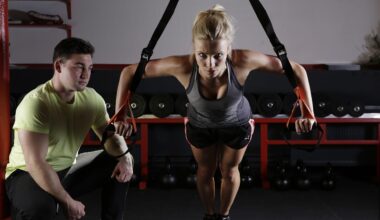Balancing Cardio and Strength Training for Competition Day
Preparing for fitness competitions requires a well-rounded approach that effectively balances both cardio and strength training. It is essential to understand how each of these components contributes to your overall performance. Cardio training is crucial for enhancing endurance, keeping your body lean, and improving cardiovascular health. On the other hand, strength training ensures that you build muscle mass, improve your power output, and maintain proper form during competition. Therefore, integrating these elements into your routine will help achieve optimal performance. One method to balance both types of training is through periodization, where you alternate focus between cardio and strength in separate training cycles. For example, during the initial phase, prioritize strength workouts while incorporating light cardio sessions. As your competition day approaches, gradually shift to higher-intensity cardio. Additionally, consider your individual body responses to different training loads and adjust accordingly. Remember to listen to your body, allowing adequate rest and recovery to prevent burnout. By maintaining this balance, you can elevate your chances for success on competition day.
Nutrition plays a significant role in optimizing your training routine as well. A personalized meal plan is essential when preparing for fitness competitions. This plan should incorporate adequate macronutrients, including carbohydrates, proteins, and fats, each serving a unique purpose. Carbohydrates provide energy for intense workouts, proteins aid muscle recovery and growth, while healthy fats support hormonal balance and overall health. It’s important to time your meals and snacks strategically around workouts to maximize performance and recovery. Pre-workout meals can give you the energy boost needed for workouts, while post-workout meals replenish your glycogen stores and facilitate recovery. Additionally, staying hydrated throughout the training process is vital, as proper hydration influences endurance and performance levels significantly. During the lead-up to the competition, assess how your body reacts to various food types and adjust your nutrition strategy accordingly. An essential component of successful nutrition is monitoring your caloric intake, maintaining a balance between energy expenditure and intake to achieve your desired physique before competition. Furthermore, consider consulting with a sports nutritionist for tailored guidance that addresses specific needs, preferences, and competition goals.
Managing Recovery and Rest
Equally important as balancing cardio and strength training is the aspect of recovery and rest. Rest days are not merely an indulgence but a crucial part of the training cycle. They allow your muscles to repair and grow, enhancing your overall performance on competition day. During your training schedule, designate at least one or two rest days per week, and use this time for light activities or mobility work, which can support muscle recovery. Furthermore, proper sleep is essential; aim for seven to nine hours of quality sleep each night to foster optimal recovery. Incorporating active recovery techniques such as foam rolling, stretching, and yoga can also help alleviate muscle tightness. Adequate nutrition, especially focusing on post-workout protein intake, can accelerate muscle recovery. On top of this, pay attention to any signs of fatigue. Feeling consistently drained may indicate overtraining; thus, adjusting your training approach is crucial. Adjust the training intensity or volume to fit your recovery state. This proactive step can keep you fresh for each workout, allowing you to perform at your peak level come competition day.
Another integral aspect of preparing for fitness competitions is mental preparedness. Competition day can be as much a mental challenge as a physical one, thus cultivating a resilient mindset is crucial. Visualization techniques, where you mentally rehearse the competition and visualize your success, can significantly increase your confidence and readiness. Setting specific, achievable goals for your performance can provide clear focus and motivation. During your training, practice mindfulness techniques to handle anxiety and stress effectively, improving your mental clarity. Engaging in relaxation exercises, such as deep breathing or meditation, can also help maintain a calm state before competition day. It’s essential to familiarize yourself with the competition environment, as this can alleviate nervousness and build familiarity with the setting. Additionally, communicating with peers or fellow competitors can be a wonderful way to share insights and experiences, providing further mental support. Emphasize positive affirmations to bolster confidence, reminding yourself of the hard work and dedication that led you to this moment. By fostering a strong mental game, you can enhance your performance and stay focused throughout the event.
Race Day Strategy
As competition day approaches, formulating a race day strategy is vital to maximizing your performance. Begin by reviewing the event schedule and preparing a detailed checklist of what to bring on race day, including nutrition, gear, and personal items. Familiarize yourself with the race course and understand how the layout might influence your pacing and energy management. Prior to race day, perform a few mock sessions to fine-tune your pre-race routine, which may include warming up, eating, and hydration strategies. Ensure you have a solid idea of your pacing plan. Starting too fast may lead to burnout, so practice pacing strategies during training. On race day, arrive early to give yourself enough time to acclimate and set up. Stick to routines that have worked for you during training, minimizing changes that could disrupt your performance. Moreover, maintain nutrition and hydration consistency; consume pre-approved snacks and sports drinks leading up to the event. Keep in mind that nerves are natural, so focus on your goals and trust in the training. A well-planned race-day strategy can enhance confidence and lead to achieving your fitness competition objectives.
Post-competition analysis is a key component of the preparation process, providing valuable insights for future events. After the competition concludes, take time to reflect on your performance critically. Identify what went well and areas needing improvement, such as your pacing, nutrition, and mental focus during the event. Gathering feedback from your coach or peers can also help to highlight strengths and weaknesses. By recognizing key performance indicators, setting actionable goals for future competitions becomes clearer. Additionally, consider recording your experiences in a training journal; this log can help track progress and keep a record of strategies that worked or did not. Furthermore, recovery should remain a priority following the competition. Engage in active recovery sessions, stay hydrated, and maintain a balanced diet to support muscle recovery. After a few days of rest, gradually return to training; adjust intensity or volume as necessary to prevent burnout. Planning a post-competition strategy will not only ease the transition back to training but keep your motivation high. Embrace the lessons learned and use them to propel forward in subsequent competitions.
Conclusion: Achieving Balance
Achieving a well-rounded balance between cardio and strength training is essential for success in fitness competitions. By understanding the unique benefits of both elements and integrating them into your training regimen, you establish a solid foundation for peak performance. Remember, this journey also prioritizes nutrition, recovery, and mental preparedness, each playing significant roles in your overall preparation. The effective management of your training, rest, and competition strategies can enhance your results. Visualize success, maintain focus on goals, and strive to continuously improve your skills. As you progress through competitions, keep refining your techniques and approaches based on your experiences, while valuing the hard work that brought you to your current achievements. Connect with fellow competitors, share insights, and foster a supporting community which can motivate you throughout the preparation journey. Each competition provides a chance to learn more about yourself, your capabilities, and your potential for growth. Ultimately, balance within your training and preparation will position you for success on competition day, as well as for the ongoing pursuit of fitness excellence.


